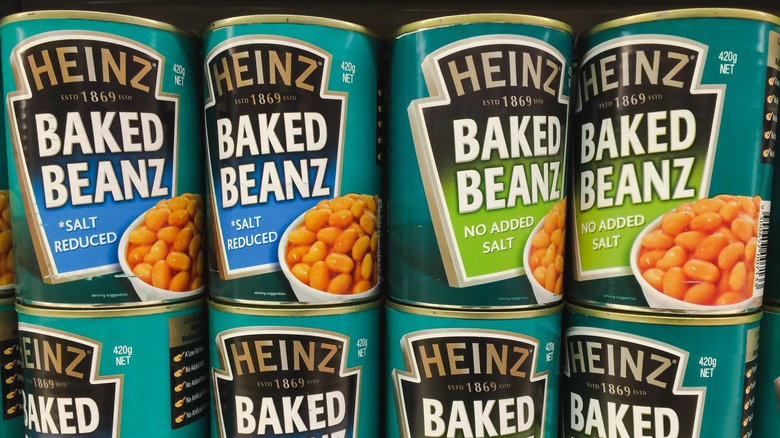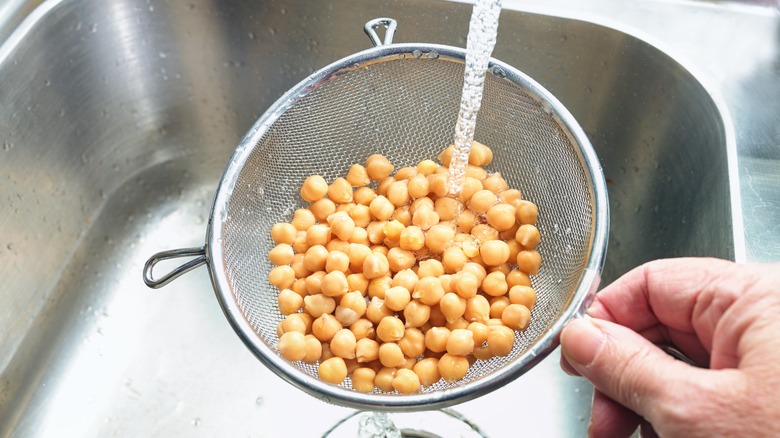Rinsing Canned Beans Has An Unexpected Effect On Your Body
Canned beans are popular for a number of reasons. Convenience might be at the top of the list. All you've got to do is open the jar and enjoy them. They are great with toast, in soups, or as ingredients in one-pot casseroles. You can even blend them to make delicious dips.
They contain a generous helping of fiber, protein, folate, iron, magnesium, potassium, and zinc — nutrients your body needs. Did you know that some have a good amount of calcium too? Turns out, you can strengthen your bones with this unexpected canned food. But if you were to speak with professional chefs, they may tell you that they prefer rinsing canned beans before using them, for a few different reasons. Not only does this make it easier to flavor the beans the way you like, but rinsed beans also mean a less glossy and sticky texture. The less sticky the beans are, the less chance of them attaching to other ingredients of a dish in a way you don't want them to.
But did you know that rinsing off your beans can also have an unexpected effect on your body? Along with isolating the beans from a thick liquid, you'll be reducing gas-producing sugar content, per the experts. This basically means that you'll be tooting a lot less after your favorite can of Heinz baked beans. (Perhaps, the people around you will thank you too.)
Rinsing canned beans can help with flatulence
A 200-gram serving of baked beans in tomato sauce could contain as much as 9.6 grams of sugar, per BBC Good Food. Excess sugar in your system can sit in your digestive tract and ferment, eventually becoming food for your gut bacteria, leading to gas buildup. Some people may experience cramping along with the gas.
There are other reasons why beans in general cause an increase in flatulence — their complex carbohydrate content, fiber profile, and lectins. Complex carbs are challenging to digest and need the help of gut bacteria to break them down, resulting in gas. While some amount of fiber is necessary to make you poop, too much or too big an amount consumed too quickly can also lead to flatulence. Bloating and gas are side effects of lectins too.
While all legumes could lead to flatulence, some are bigger trouble-makers in that department, per registered dietitian nutritionist Kelsey Kunik (via Eating Well). "Soybeans, pinto beans, black beans, and lentils are most likely to cause gas because of the amount of fermentable sugars and fiber," explained the expert. Straining the canned goods in a colander or sieve and holding them under running water for a few minutes helps remove the added sugar component. But this is not all that gets removed during a good old rinse.
Rinsing canned beans also gets rid of too much sodium
The sodium content of canned beans is also a common concern among dieticians. Some think that rinsing the stuff gets rid of as much as 40% of the salt.
While your body needs some amount of sodium to maintain fluid balance and make sure your muscles and nerves are functioning as they ought to, some foods contain more sodium than you realize — like canned beans. For example, in the same instance of a 200-gram can of baked beans in tomato sauce, you'd get 1.3 grams (1,300 milligrams) of sodium, per BBC Good Food. To put that in perspective, the general recommendation for daily intake of sodium is between 2,000-2,300 milligrams for an adult, per Mayo Clinic. Think about how quickly your daily intake of salt can add up if just your canned baked beans have 1,300 milligrams.
Too much sodium has negative effects on your body too, like high blood pressure, heart disease, and stroke. Feeling bloated; swelling in your face, hands, ankles, and feet; feeling really thirsty; having disturbed sleep; and needing to pee often are all signs that you're consuming too much salt. If you have rapid unexpected weight gain, you may want to look at your sodium consumption too. Alternatively, if you don't like the idea of rinsing off the beans and you're worried about the sodium content, try looking for the low-sodium or no-sodium varieties.



